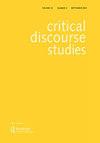How to ‘decaffeinate’ a legislative report: emerging discourses on the climate change-migration nexus within the European Parliament
IF 2.1
2区 文学
Q2 COMMUNICATION
引用次数: 0
Abstract
ABSTRACTThis paper examines the different discourses adopted concerning the climate change-migration nexus within the European Parliament (EP). It uses a critical discourse analysis approach to analyse a specific motion for resolution report, its amendments, and plenary debates, as well as an expert interview with the rapporteur to gain further insights into the political dynamics and challenges involved in the process. An own-initiative report is chosen for the analysis to reveal conflicting discourse-making processes between various political groups within the EP and to better understand the role of the EP in the legislative branch of the European Union. It is found that political ideology plays an influential role. Even though political groups agree on the aims of the report, they constantly debate and use amendments to change content and extent. Therefore, we claimed that political discourses in a parliamentary setting should be analysed by specifically evaluating diagnostic, prognostic, and motivational arguments of discourses.KEYWORDS: Climate changemigrationEuropean Parliamentown-initiative procedurecritical discourse analysis AcknowledgementsWe would like to express our sincere thanks to Thomas Faist for his helpful comments and guidance in developing this paper from a research placement on climate change and migration at Bielefeld University. We are also grateful to two anonymous reviewers for their invaluable insights and feedback.Disclosure statementNo potential conflict of interest was reported by the author(s).Notes1 Argentinian and Spanish politician González holds a prominent position within the Spanish Socialist Workers' Party (PSOE) and has served as a member of the Madrid Assembly. Since 2019, she has been actively involved in the EP as a member, where she serves as the Co-Chair of the Intergroups for Disability and Anti-Racism and Diversity. Additionally, she has taken on the role of EP Standing Rapporteur for humanitarian aid.2 S&D is the second largest political group in the European Parliament, with 143 members out of 769. This gives the S&D a share of 18.60% of the Parliament's total membership. The S&D is a centre-left and pro-EU political group that is committed to the values of social justice, equality, and social democracy.3 MEP González employed the term ‘decaffeination’ to emphasise how centre-right, and right political groups sought to diminish the report's content, in other words, to dilute or weaken it.4 Draft report – on the impacts of climate change on vulnerable populations in developing countrieshttps://www.europarl.europa.eu/doceo/document/DEVE-PR-650537_EN.html.5 Amendments 1–309https://www.europarl.europa.eu/doceo/document/DEVE-AM-657479_EN.pdf.6 Final reporthttps://www.europarl.europa.eu/doceo/document/A-9-2021-0115_EN.pdf.7 The impacts of climate change on vulnerable populations in developing countries (debate)https://www.europarl.europa.eu/doceo/document/CRE-9-2021-05-17-ITM-022_EN.html.8 EPP is the largest political group in the EP, with 177 members with the 23.02% of the Parliament's total membership. The EPP is a centre-right and pro-EU political group that is committed to the values of liberal conservatism and Christian democracy.9 Renew is a group of liberal and pro-European political parties in the EP. It has 101 members, representing 13.13% of the Parliament's total membership. The group is committed to classical, social and conservative liberalism.10 ECR is a centre-right, anti-federalist political group in the EP. It has 66 members, representing 8.58% of the Parliament's total membership. The group's main goals are to protect national sovereignty, promote free markets, and reduce the size and scope of the EU.11 Identity is a right-wing, Eurosceptic and anti-immigration political group in the EP. It has 62 members, representing 8.06% of the Parliament's total membership. The group's main goals are to protect national identity, halt immigration, and promote a more traditional vision of Europe.12 The Greens are a centre-left political group that advocates for environmental protection, regional autonomy, and European integration. They have a membership of 72 and hold 9.36% of the seats in the EP.13 GUE/NGL is a left-wing political group with Eurosceptic democratic socialist and communist parties. They have a membership of 37 and hold 4.81% of the seats in the EP.Additional informationNotes on contributorsMert SöylerMert Söyler holds an MA in sociology from Bielefeld University. His research interests include historical sociology, political sociology, nationalism, and critical discourse analysis.Martín Torino ZavaletaMartín Torino Zavaleta holds an MA in sociology from Bielefeld University and an MSc in global politics from Birkbeck University. His research interests include framing, discourse analysis, and global governance.Olivia Jane WhelanOlivia Jane Whelan holds an MA in sociology from Bielefeld University and the position of Managing Editor of the journal Global Social Policy. Her research interests include global governance and migration, with a methodological focus on discourse analysis.如何“脱咖啡因”立法报告:欧洲议会内关于气候变化-移民关系的新兴话语
摘要本文考察了欧洲议会(EP)内部关于气候变化-移民关系的不同论述。它使用批判性话语分析方法来分析决议报告的具体动议,其修正案和全体会议辩论,以及与报告员的专家访谈,以进一步了解该过程中涉及的政治动态和挑战。本文选择了一份主动报告进行分析,以揭示欧洲议会内部不同政治团体之间相互冲突的话语制定过程,并更好地理解欧洲议会在欧盟立法部门中的作用。研究发现,政治意识形态在其中起着重要作用。尽管政治团体对报告的目的达成一致,但他们不断辩论并使用修正案来改变内容和范围。因此,我们认为议会环境中的政治话语应该通过具体评估话语的诊断性、预测性和动机性论证来分析。本文作者Thomas Faist在比勒菲尔德大学从事气候变化与移民的研究工作,在此过程中,他提供了有益的意见和指导,我们对此表示衷心的感谢。我们也感谢两位匿名评论者,他们提供了宝贵的见解和反馈。披露声明作者未报告潜在的利益冲突。注1阿根廷和西班牙政治家González在西班牙社会主义工人党(PSOE)中占有重要地位,并曾担任马德里议会成员。自2019年以来,她一直作为成员积极参与欧洲议会,在那里她担任残疾与反种族主义和多样性小组的联合主席。此外,她还担任欧洲议会人道主义援助问题常设报告员S&D是欧洲议会第二大政治团体,在769个席位中拥有143个席位。这使得S&D在议会成员总数中占有18.60%的份额。标准与发展党是一个中左翼、亲欧盟的政治团体,致力于社会公正、平等和社会民主的价值观MEP González使用“脱咖啡因”一词来强调中右翼和右翼政治团体如何试图减少报告的内容,换句话说,稀释或削弱它报告草案-关于气候变化对发展中国家弱势群体的影响https://www.europarl.europa.eu/doceo/document/DEVE-PR-650537_EN.html.5修正案1-309https://www.europarl.europa.eu/doceo/document/DEVE-AM-657479_EN.pdf.6最终报告ttps://www.europarl.europa.eu/doceo/document/A-9-2021-0115_EN.pdf.7气候变化对发展中国家弱势群体的影响(辩论)https://www.europarl.europa.eu/doceo/document/CRE-9-2021-05-17-ITM-022_EN.html.8欧洲人民党是欧洲议会中最大的政治集团,有177名成员,占议会总成员的23.02%。欧洲人民党是一个中右翼和亲欧盟的政治团体,致力于自由保守主义和基督教民主的价值观Renew是欧洲议会中的一个自由和亲欧政党集团。它有101个成员,占议会成员总数的13.13%。该团体致力于古典的、社会的和保守的自由主义ECR是欧洲议会中一个反联邦主义的中右翼政治团体。它有66个成员,占议会成员总数的8.58%。该组织的主要目标是保护国家主权,促进自由市场,缩小欧盟的规模和范围。身份是欧洲议会中的右翼,欧洲怀疑论者和反移民政治团体。它有62个成员,占议会成员总数的8.06%。该组织的主要目标是保护民族认同,阻止移民,并促进更传统的欧洲愿景。绿党是一个中左翼政治团体,主张环境保护,区域自治和欧洲一体化。他们有72个成员,在欧洲议会中占有9.36%的席位。GUE/NGL是一个左翼政治团体,由怀疑欧洲的民主社会主义和共产主义政党组成。他们有37个成员,在欧洲议会中占有4.81%的席位。smert SöylerMert Söyler拥有比勒费尔德大学社会学硕士学位。他的研究兴趣包括历史社会学、政治社会学、民族主义和批评话语分析。Martín Torino ZavaletaMartín Torino Zavaleta拥有比勒费尔德大学社会学硕士学位和伯克贝克大学全球政治学硕士学位。他的研究兴趣包括框架、话语分析和全球治理。
本文章由计算机程序翻译,如有差异,请以英文原文为准。
求助全文
约1分钟内获得全文
求助全文

 求助内容:
求助内容: 应助结果提醒方式:
应助结果提醒方式:


